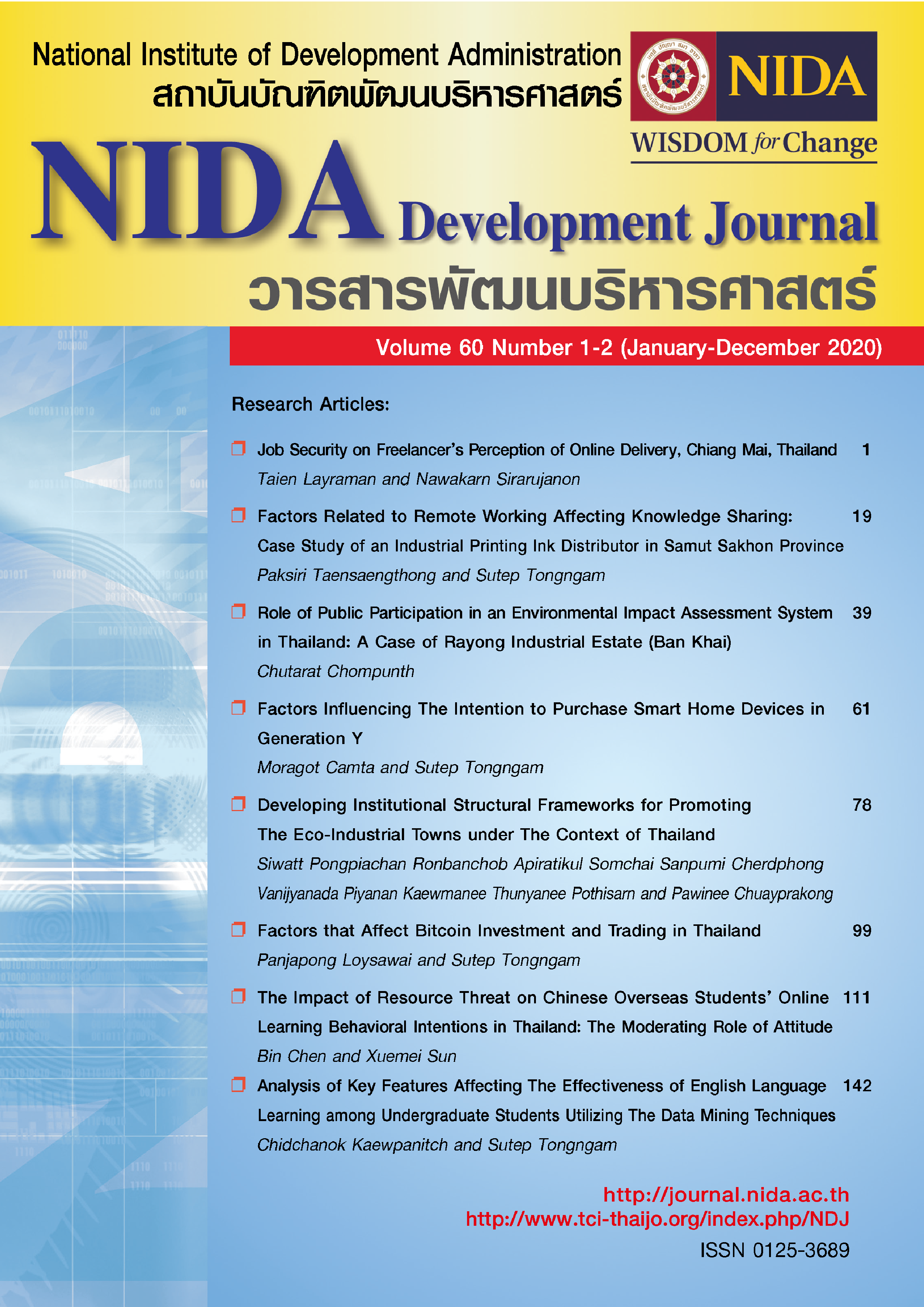Job Security on Freelance Employee's Perception on Online Delivery, Chiang Mai, Thailand
Keywords:
Job Security, Freelance Employee, Online Delivery, Quality of Work LifeAbstract
Online delivery transforms job positions for freelance employees, particularly in Chiang Mai, Thailand. Therefore, this research examines freelance employees’ perception of their job security and quality of work life in an online delivery industry in Chiang Mai, Thailand. The data are collected from 400 freelance employees in Chiang Mai, Thailand. Multiple regression is used to identify job security determining freelance employees. The results show the high-level job security of employees in the online delivery industry in particular. Most of the respondents are confident that they will be able to maintain their quality of work life and steady income growth with their current career path. The result indicates that online delivery in Chiang Mai, Thailand, can adjust their employment structure from marketing retail disruption, and they feel secure with their current jobs.
References
Abasolo, H. D. & Gehana D. L. (2021). Operational strategies of online food delivery businesses in Camarines Norte, Philippines. International Journal of Current Science Research and Review, 04(08). https://doi.org/10.47191/ijcsrr/v4-i8-14.
Adams, E. (2013). Freelance freedom: Starting a freelance business, succeeding at self-employment, and happily being your own boss. L.A. Mulnix, Publisher.
Andrew, B. & Marc, C. (2020). The relationship between freelance workforce intensity, business performance and job creation. Small Business Economics, 55(2), 399–413. https://doi.org/10.1007/s11187-019-00241-x.
Anindita, R., Lindawati, Rachman, T., & Hasyim. (2018). How demographics affect quality of work life and Work-Life Balance. Proceedings of the 1st International Conference on Recent Innovations (ICRI 2018), pages 2616-2627. https://doi.org/10.5220/0009949226162627
Barley, W. C. (2015). Anticipatory work: How the need to represent knowledge across boundaries shapes work practices within them. Organization Science, 26(6), 1612–1628. https://doi.org/10.1287/orsc.2015.1012
Boyd, J. K. (2002). A comparison of Cronbach's coefficient alpha and latent variable model estimates of composite reliability for congeneric measures. ETD Collection for Fordham University.
Chong, J. X. Y., & Gagné, M. (2019). Self-determination theory for work motivation. Management. https://doi.org/10.1093/obo/9780199846740-0182
Conen, W. & Schippers, J. (2019). Self-employment: Between freedom and insecurity. Self-Employment as Precarious Work, 1–21. https://doi.org/10.4337/9781788115032.00006
Funda Ustek-Spilda, Richard Heeks, Mark Graham, Alessio Bertolini, Srujana Katta, Sandra Fredman, Kelle Howson, Fabian Ferrari, Mounika Neerukonda, Pradyumna Taduri, Adam Badger, and Nancy Salem. (2020). The Gig Economy and Covid-19: Fairwork Report on Platform Policies, The Fairwork Project. Oxford Internet Institute.
Gentry, B., Stawiski, S., Eckert, R., & Ruderman, M. (2015). Crafting your career: Cultural variations in career-relevant relationships [White paper].Center for Creative Leadership. https://doi.org/10.35613/ccl.2015.1007
Guillén, M. (2017). Creating better human motivation theories for personal flourishing in organizations. Personal Flourishing in Organizations, 49–65. https://doi.org/10.1007/978-3-319-57702-9_4
Hora, O. (2019). Policy adaptation to address early job insecurity in Europe. Youth Unemployment and Job Insecurity in Europe, 158–183. https://doi.org/10.4337/9781788118897.00015
Jarosch, G. (2021). Searching for job security and the consequences of job loss. Working Paper 28481. National Bureau of Economic Research. https://doi.org/10.3386/w28481
Kadnichanskaya, M., & Galkina, E. (2019). Freelance as a modern form of employment in the labor market in socio-economicspace of the City Ulyanovsk. Logos Et Praxis, (4), 125–132. https://doi.org/10.15688/lp.jvolsu.2019.4.15
Katsimi, M. (2008). Training, job security and incentive wages. Scottish Journal of Political Economy, 55(1), 67–78. https://doi.org/10.1111/j.1467-9485.2008.00442.x
Kirchner, J., & Mittelhamm, E. (2010). Employee or freelance worker. Key Aspects of German Employment and Labour Law, 37–43. https://doi.org/10.1007/978-3-642-00678-4_4
Kirchner, J., & Wilhelm, K. (2017). Chapter 4 employee or Freelance Worker. Key Aspects of German Employment and Labour Law, 45–52. https://doi.org/10.1007/978-3-662-55597-2_4
Lei, D., & Lin, H. (2019). Research on problems and countermeasures of new employment form in the new period. Proceedings of the 2019 3rd International Conference on Economic Development and Education Management (ICEDEM 2019). https://doi.org/10.2991/icedem-19.2019.36
Lu, W., Liu, X., Liu, S., & Qin, C. (2021). Job security and organizational citizenship behaviors in Chinese hybrid employment context: Organizational identification versus psychological contract breach perspective differences across employment status. Frontiers in Psychology, 12. https://doi.org/10.3389/fpsyg.2021.627934
Markel, M. W., Marquis, J. P., Schirmer, P., Robson, S., Saum-Manning, L., Hastings, K., Best, K. L., Panis, C., Ramos, A., & Bicksler, B. A. (2018). Career Development for the Department of Defense Security Cooperation Workforce. RAND Corporation.
Muhsin, M. (2021). Legal protection for Indonesian freelance workers in law number 11 of 2020 concerning work creation: Analysis of changes in legal protection for freelance workers in Indonesia after the omnibus law. International Journal of Law and Politics Studies, 3(2), 56–64. https://doi.org/10.32996/ijlps.2021.3.2.8
Nicholas, L. H. (2014). Lifetime job demands, work capacity at older ages, and Social Security Benefit claiming decisions. SSRN Electronic Journal. https://doi.org/10.2139/ssrn.2530030
Payoneer. (2020). The 2020 Freelancer Income Report. Payoneer Inc., https://explore.payoneer.com/2020-freelancer-income-report/.
Pragarauskaitė, J., & Dzemyda, G. (2012). Visual decisions in the analysis of customers online shopping behavior. Nonlinear Analysis: Modelling and Control, 17(3), 355–368. https://doi.org/10.15388/na.17.3.14061.
Shipton, H. J., West, M. A., Parkes, C. L., Dawson, J. F., & Patterson, M. G. (2007). When promoting positive feelings pays: Aggregate job satisfaction, work design features, and innovation in manufacturing organizations. European Journal of Work and Organizational Psychology, 15(4), 404–430. https://doi.org/10.1080/13594320600908153
Walker, S. W., & Foushée, J. E. (2014). Security job descriptions. Security Careers, Skills, Compensation, and Career Paths. Security Executive Council. 39–117. https://doi.org/10.1016/b978-0-12-800104-2.00004-9
Walton, R. E., Cutcher-Gershenfeld, J. E., & McKersie, R. B. (2000). Strategic negotiations: A theory of change in labor-management relations. ILR Press/Cornell University Press.
Wright, J. (2009). Security? what security? [job security]. Engineering & Technology, 4(3), 80–81. https://doi.org/10.1049/et.2009.0321
Yonk, R. M., Smith, J. T., & Wardle, A. R. (2017). Building a quality of life index. Quality of Life and Quality of Working Life. https://doi.org/10.5772/67821
Downloads
Published
How to Cite
Issue
Section
License
Copyright (c) 2024 NIDA Development Journal

This work is licensed under a Creative Commons Attribution-NonCommercial-NoDerivatives 4.0 International License.





